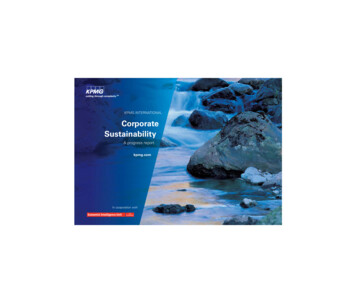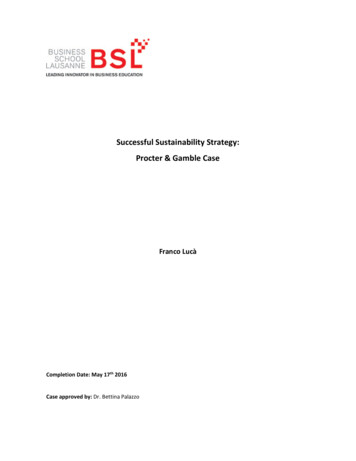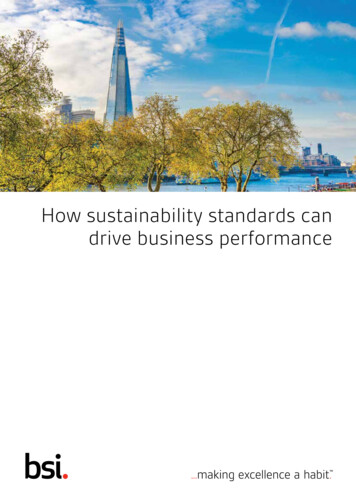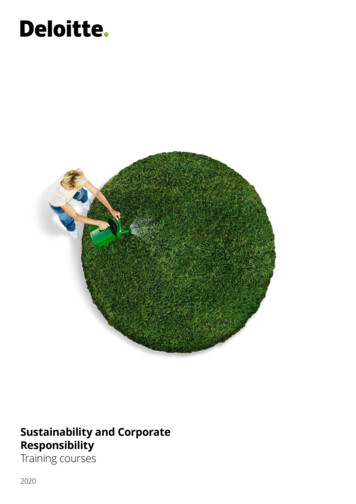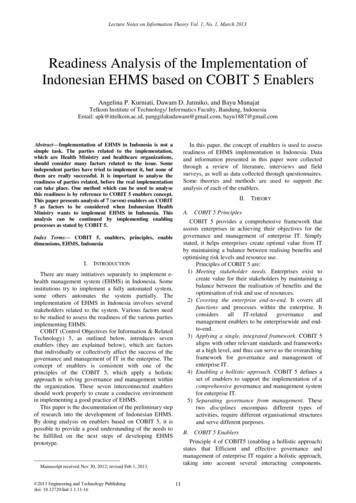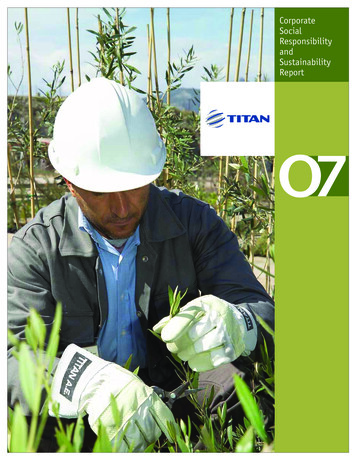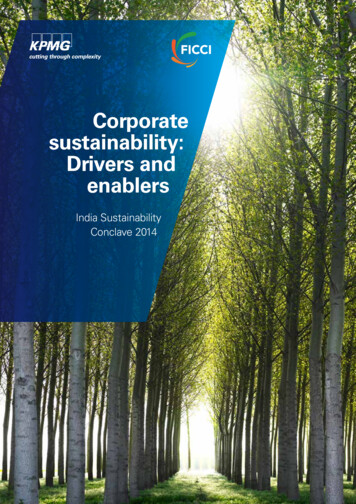
Transcription
Corporatesustainability:Drivers andenablersIndia SustainabilityConclave 2014 2010 KPMG, an Indian Partnership and a member firm of the KPMG network of independent member firmsaffiliated with KPMG International Cooperative (“KPMG International”), a Swiss entity. All rights reserved.
2014 KPMG, an Indian Registered Partnership and a member firm of the KPMG network of independent member firms affiliated with KPMG International Cooperative (“KPMG International”), a Swiss entity. All rights reserved.
Table of contentsForeword from FICCI01Foreword from KPMG02Chapter 103Global drivers for corporate sustainabilityChapter 2Indian drivers for corporate sustainabilityChapter 3Enablers for corporate sustainability in the Indian contextChapter 40811Global trends in corporate sustainability13About FICCI15About KPMG16Acknowledgements18 2014 KPMG, an Indian Registered Partnership and a member firm of the KPMG network of independent member firms affiliated with KPMG International Cooperative (“KPMG International”), a Swiss entity. All rights reserved.
1Foreword from FICCIThe Indian corporate sector has taken initiatives on the social and environmental frontfor several decades, either driven by compliance or driven by a market pull. Therefore,the core elements of environmental and social concerns are not new to corporates.These initiatives are not necessarily formulated under a ‘sustainability’ frameworkfor companies, thereby directing the focus mostly towards companies who are todayformally reporting on sustainability.The sustainability dialogue has in the last three years taken a new turn becauseof various regulatory requirements such as Business Responsibility Reporting(BRR) arising out of the National Voluntary Guidelines for Social and EnvironmentalResponsibility (NVGs) and the Corporate Social Responsibility (CSR) provisionsunder the Companies Bill. This has started a new conversation within the corporatesector on the appropriate paradigm for sustainability. At the same time, it hasresulted in a confusing debate, on the one hand, on the relationship between CSRand sustainability and, on the other hand, about the overlaps in terms of reportingrequirements. We are at a juncture where this debate must clear the air and providecompanies the contours for internalising social and environmental concerns.Ultimately a business is sustainable if it has factored in social concerns. Then whereis the dichotomy?FICCI launched the India Sustainability Conclave in 2012 as an annual platformto engage businesses and other stakeholders on corporate sustainability and itsmainstreaming in India, and to create a momentum towards adoption of sustainabilitypractises.This year’s Conclave, the third in the series, will focus on global trends on corporatesustainability, the relationship between CSR and Sustainability, sustainabilityof supply chains, future of sustainability reporting, sustainability as a BusinessExcellence Mantra, responsible investment, and the roadmap for corporatesustainability in India. We hope these topics would bring greater clarity to companieswho have already embarked and to those who are planning to embark on thesustainability journey.We are happy to have KPMG in India as the Knowledge Partner for the Conclave thisyear. The FICCI - KPMG Knowledge Paper titled ‘Corporate Sustainability: Driversand Enablers’ would provide a good reference point for the discussion on CorporateSustainability as it stands today. FICCI looks forward to taking this dialogue withthe corporate sector and government forward. We also hope to draw from theinternational experience in this space and I am sure that the participation of diversestakeholders will help bring in deeper insights on sustainability practices in India andglobally.A Didar SinghSecretary GeneralFICCI 2014 KPMG, an Indian Registered Partnership and a member firm of the KPMG network of independent member firms affiliated with KPMG International Cooperative (“KPMG International”), a Swiss entity. All rights reserved.
2Foreword from KPMGRapidly proliferating corporate sustainability initiatives are restoring the balancebetween regulation and voluntary activities. Today, the attitude towardssustainability investment is not merely defined by compliance requirements,but by the pressing demands of climate change and reasonable expectations ofstakeholders. Even in the face of economic downturn, sustainability has ceased tobe an optional topic in the strategy harvesting process, and has become a mediumto filter risks and optimise opportunities for growth. Companies are ensuring thatthe key focus is not merely on accumulation of financial returns, but a curation ofleading practice and material issues, that are aligned with the company’s businesspriorities.No company is immune to the increasing number of regulations, industry measuresor consumer driven initiatives on sustainability. Depending on the industry sector,location or type of work, the aspect and extent of exposure to environmental,social and economic risks might differ. But, the need for a long term strategythat addresses global and national drivers that are steering the path of corporatesustainability is unquestionable.The FICCI India Sustainability Conclave 2014 is aimed at highlighting several suchdevelopments on corporate sustainability, especially in India. This Knowledge Paper‘Corporate sustainability: Drivers and enablers’ is expected to set the context forcorporate deliberations at the Conclave, and act as a platform for enhancing thedialogue on this topic. KPMG in India is proud to be associated with FICCI in bringingout these key observations on sustainability strategy, governance and practices ofreporting.Raajeev B BatraPartner and HeadGovernance Risk and Compliance Services,Climate Change and Sustainability 2014 KPMG, an Indian Registered Partnership and a member firm of the KPMG network of independent member firms affiliated with KPMG International Cooperative (“KPMG International”), a Swiss entity. All rights reserved.
3Corporate sustainability: Drivers and enablersChapter 1Global driversfor corporatesustainabilityThe mainstreaming of sustainability into corporate businessoperations has been gradual. Initially, corporate sustainabilityprograms were focussed on facilitating compliance withenvironmental standards and safeguarding natural resources.Sometimes, they were also standalone acts of philanthropy.However, today’s programs adopt new environmentally andsocially conscious sustainability approaches that reducerisks while delivering enhanced profitability. This is a multidimensional benefit scenario, achieved through a combinationof improved resource-accessibility, cost-reduction, marketingand recruiting benefits. According to the KPMG InternationalSurvey of Corporate Responsibility Reporting 2013, over halfof the reporting companies worldwide (51 per cent) includesustainability information in their annual financial reports. This isa striking rise since 2011 and 2008, where only 20 per cent andnine per cent companies respectively included sustainabilityinformation in their financial reports. Also, many companies nolonger saw corporate responsibility as a moral issue, but as amedium for identifying core business risks and opportunities.More and more investors accepted that environmental and socialfactors put company value at stake.Stakeholder awareness and business’ increased exposure toregulators, customers, and investors is expanding the ambitof sustainability. Most corporates now feel the need to define,implement, measure and communicate their sustainabilitystrategy. Improving sustainability perception in today’s worldmakes good business sense. It helps identify and address theconcerns of key external and internal stakeholders. It contributesdirectly to triple bottom-line profitability, mitigates risks,enhances brand image, creates a competitive edge and boostsemployee morale. Now more than ever, failing to adopt impactfulsustainability practices throughout an organisation meansmissing opportunities for improving commercial performance.Executives recognise that tangible, results-focused sustainabilitystrategies are evidence of sound management, resulting inincreased readiness to adapt to changing markets and respond tocustomer needs. A clear sustainability strategy helps to provideconfidence and reassurance to stakeholders that a company hasa solid foundation for future success.1Sustainability is a long-term goal and an evolving agenda. Thereis no ‘one-fits-all’ approach to sustainability, and translating itinto action means defining it in the company’s context. Further,such actions and operational implementation cannot beseparated from public perception. Capitalising on sustainabilityinvolves behavioral changes and developing a new corporateculture. Every business unit and function of a company will betouched by sustainability. Adopting sustainability as the wayof doing business may bring in path-breaking business modelsor approaches. Market dynamics, coupled with increasedeconomic uncertainty increase the need for corporate entities tobetter understand the risks associated with their sustainabilityprograms. Every company has its own reason for investing insustainability. Broadly, the drivers can be categorised as: Regulations Access to capital Expanded consumer base Social license to operate Innovation Brand and Reputation Operational Efficiency.Driver 1 – RegulationsLegislation can be a powerful force of change. The stanceand level of activity by various governments on corporatesustainability is varied across the globe. Currently there are over1700 regulations related to climate change worldwide, that areimplemented, planned or have been superseded1. The regulatoryagenda for certain energy intensive sectors has been set, withthe number of regulations increasing by the day. Althoughthe current economical and political situation is not in favor ofmaterialising far-reaching regulatory changes in the short term,environmental and social disasters have made it certain that moreregulation is set to continue. Bottom-line is that companies needto be imatechange/?refine true&countries AllCountries,accessed on 10 January 2014, 4:00 pm 2014 KPMG, an Indian Registered Partnership and a member firm of the KPMG network of independent member firms affiliated with KPMG International Cooperative (“KPMG International”), a Swiss entity. All rights reserved.
Corporate sustainability: Drivers and enablersUnited States ofAmericaIn 2009, the President had called on the Federal government, U.S.A.’s largest consumer of energy, to set an example in achieving sustainable operationsand energy efficiency. Executive Order 13514 requires Federal agencies to report and reduce greenhouse gas pollution2. It is expected that the federalgovernment’s sustainability goals and reporting requirements will encourage business entities to develop their own sustainability strategies. Many U.S.government agencies, including the Environmental Protection Agency (EPA), the Securities and Exchange Commission (SEC), and Federal Trade Commission(FTC) are increasing the expanse of their sustainability performance. These include the following: Effective in December 2011, the EPA established mandatory greenhouse gas (GHG) reporting requirements (40 CFR Part 98) for large sources andsuppliers in the United States3 In response to requirements in the 2010 Dodd-Frank Act, the SEC adopted conflict minerals reporting requirements4 The FTC has issued Guides for the Use of Environmental Market Claims (Green Guides) to address sustainability reporting at the product level.5European UnionIn October 2011, the European Commission issued a press release communicating a new definition and strategy for corporate social responsibility for theyears 2011 through 20146. The European Commission now defines CSR as ‘the responsibility of enterprises for their impacts on society’ and calls for publicauthorities of the EU Member States to support corporate social responsibility through a mix of voluntary policy measures and necessary complementaryregulation. In the Single Market Act I & II7, the European Commission announced its intention to adopt a legislation aimed at improving the transparency ofcompany disclosures pertaining to social and environmental information. Of the 27 EU member states, only 15 have national policy frameworks to supportcorporate social responsibility. Further, at the U.N. Conference on Sustainable Development (Rio 20) held in June 2012, EU Member States opined thatcorporate sustainability reporting was useful and decided to encourage companies to integrate sustainability disclosures in their annual financial reports.Four EU Member States, along with Brazil, Denmark, France, and South Africa are working with the Global Reporting Initiative (GRI) and the United NationsEnvironment Programme (UNEP) to further encourage integrated reporting8.United KingdomIn 2013, U.K. became the first country to mandate companies to disclose their greenhouse gas emissions. As per the 2013 rules to The Companies Act 2006,the annual Directors’ Report of a company must now include a detailed methodology and quantification of it’s greenhouse gas emissions. Where obtainingdata for determining emissions is not feasible, the reason must be cited clearly9.CanadaEnvironment Canada, a Canadian government department, has several initiatives, including the Carbon Disclosure Project, the National Pollutant ReleaseInventory, and the Greenhouse Gas Emissions Reporting Program to ensure that information on corportae sustainability performance is easily accessible andused in various decision making processes10.South AfricaEffective in March 2010, South Africa’s third report on corporate governance (King III), recommended that companies integrate sustainability disclosure withfinancial reporting11.IndonesiaIndonesia, over a period of years has launched several regulations to encourage/mandate various public and private sustainability initiatives. These include:India4 Companies must include information on environmental and social responsibility initiatives in their annual report. Companies that do not carry out socialand environmental responsibilities as stipulated by law, are liable to be penalised Publicly-listed companies are required to disclose information on their CSR programs in their Annual Report. Information about CSR, including CSRbudget and spend included in the annual report must be submitted to the General Meeting of Shareholders for approval Central government, local governments and state-owned companies have been mandated to achieve pre-set electricity, fossil fuel and water savingtargets12.The Indian regulatory scenario has witnessed significant activity in the past two years. Building on the base created by various voluntary initiatives tostreamline corporate sustainability, the Securities and Exchange Board of India introduced a new reporting requirement in August 2012. It mandated the Top100 listed companies on Indian bourses to include a report on their Business Responsibility towards Environmental, Social and Economic aspects, in theirAnnual Reports. Subsequently, in 2013, the Companies Act was revised. Section 135 of this Act requires companies meeting set eligibility criteria to spend 2per cent of their annual profit on CSR activities. A progress report on the activities undertaken must form a part of the Annual Report and signed by a Directorof the company13.What is more important than the current regulatory regime is the prospective agenda of future regulations in context of the frequentand clearly visible impacts of climate change. Evidently, there will be winners and losers between and within sectors, wherehistorically well-prepared and targeted segments will have a competitive ts/2009fedleader eo essed on 27 January 2014, 6:00 f, accessed on 27 January 2014, 6:00 des.pdf, accessed on 27 January 2014, 6:00 x en.htm, accessed on 27 January 2014, 6:00 do?uri COM:2010:0608:REV1:EN:PDF#page 2http://ec.europa.eu/internal market/smact/docs/single-market-act2 erv.do?uri COM:2011:0681:FIN:EN:PDF, accessedon 27 January 2014, 6:00 pdf, -corporate-socialresponsibility-reporting/ accessed on 27 January 2014, 6:00 and-corporate-social-responsibility-reporting/, ssed on 27 January 2014, 6:00 ttp://www.sebi.gov.in/cms/sebi data/attachdocs/1344915990072.pdf, 3.pdf, accessed on 27 January 2014, 6:00 pm9 2014 KPMG, an Indian Registered Partnership and a member firm of the KPMG network of independent member firms affiliated with KPMG International Cooperative (“KPMG International”), a Swiss entity. All rights reserved.
5Corporate sustainability: Drivers and enablersDriver 2 – Access to capitalSustainability challenges can have a significant and measurableimpact on key financial value drivers. A cohort of lendinginstitutions has quantified these impacts and adoptedcomprehensive ‘Responsible Investment’ guidelines. While theprimary intention is to minimise the negative environmental andsocial impacts in projects financed, the fact that responsibleorganisations are better prepared to deliver superior financialperformance cannot be ignored. Corporate activity towardsintegrating sustainability into business operations enhancesaccess to capital in two ways: countries, by number of signatories to UNPRI14.However, theproceedings in the past three years have been encouraging,with an increasing number of country governments,investment regulators and industry associations encouragingresponsible investment practices. Leading banks, funding institutions and capital providersseek information on companies’ environmental and socialperformance. Popular project Environment, Social andGovernance (ESG) evaluation standards include EquatorPrinciples, UN Principles on Responsible Investment (UNPRI),IFC Performance Standards and The Climate Principle. Mostlarge international banks have customised standards forevaluating project proposals across various sectors. The graphbelow showcases an increase in the quantum of assets undermanagement and number of signatories to the UNPRI over aperiod of 8 years13.Figure 1: Assets under management through 06April-07 April-08Number of signatoriesApril-09April-10April-11 April-12April-13Assets under management (US trillion)Source: UNPRI, http://www.unpri.org/news/pri-fact-sheetUnlike the mature investment practices in America, Europeand Australia, where state pension plans and stock listingrequirements incorporate ESG parameters, adoption ofResponsible Investment guidelines in Asia is still emerging.For example, no Asian country features in the list of the Top 12http://www.unpri.org/news/pri-fact-sheet/UNPRI Annual Report 201216Does the Market Respond to an Endorsement of Social Responsibility? The Role of Institutions,Information, and Legitimacy http://web.cim.org/csr/documents/Block669 c disclosures on sustainability performance are utilisedby analysts to benchmark historic performance, establishlinkages between financial and non-financial parametersand evaluate trends. Several stock exchanges and indiceshave been set up to work exclusively on establishing theseconnections. The major indices include the Dow JonesSustainability Index, FTSE4Good Index series, MSCISustainability Index and STOXX. Research shows that beingadded to a sustainability index doesn’t increase a company’sshare price, but when a company is removed, firms wereshown to loose more than 1.2 per cent of their marketvalues in only two days following the announcement of theirremoval15. This trend is widespread even in rapidly developingcountries like India, where BSE has launched two new indicesS&P BSE Greenex and S&P BSE Carbonex16. Whereas S&PBSE Greenex lists the top 25 companies among S&P BSE100, in terms of their quantitative and objective performanceindicators on energy efficiency, S&P BSE Carbonex is a tiltedversion of S&P BSE 100 on the basis of commitment tomitigating climate change.While expectations around corporate sustainability are usuallyfocused at large corporates, lending institutions have placed nosuch bias in evaluating small or large companies for ESG risks17.Taking cue from the responsible lending requirements of leadingbanks, many companies are securing the sustainability of theirsupply chains. Activities range from encouraging or preferringto mandating balance scorecard evaluation methods. Forexample, an AT Kearney and WRI study identified that the effectsof environmental change (e.g. natural resources constraints,new government policies) on FMCG companies could resultsin earnings fall by 13-31 per cent by 2013 and 19-47 per cent inearnings in 2018 if they do not implement sustainable strategiesthroughout their supply chains18.As the paradigms of sustainability shift, it is not just the carbonintensive sectors, but all ‘resource intensive’ product and serviceofferings, cutting across all verticals of business that could beimpacted by investor interest in corporate sustainability.18Rattling supply chains - The Effect of Environmental Trends on Input Costs for the Fast-MovingConsumer Goods Industry http://pdf.wri.org/rattling supply chains.pdf 2014 KPMG, an Indian Registered Partnership and a member firm of the KPMG network of independent member firms affiliated with KPMG International Cooperative (“KPMG International”), a Swiss entity. All rights reserved.
Corporate sustainability: Drivers and enablersDriver 3 – Expanded consumer baseIn principle, access to market can be both, internal (within theregion or country) and external (outside the country). Companieswith inclusive strategies or better brand value in terms of going‘green’ would be better placed to compete in newer markets. Thisis primarily on account of emerging regulatory requirements andincreasing consumer awareness.An Ipsos poll in US revealed that 25 per cent of consumers (whoresponded to the survey) proactively adopted a green lifestyle,reflected in the type of products they buy and services they use.These range from recycling, usage of energy efficient vehicles,eco-friendly products and choosing the HVAC equipmentfor their homes. What is notable is that nearly half of therespondents (46 per cent) said that they were more inclined tobuy an environmentally friendly product. However, the profile ofconsumers preferring ‘green’ products is skewed towards collegegraduates, Northeasterners and adults under 3519.Consumer awareness in this aspect is also evident from therising number of anti-greenwashing drives initiated at variousscales. Tapping into this growing pool of knowledgeable buyerswill become critical to achieving exponential growth numbers.While incorporating sustainability into product design andoperations has been welcomed by stakeholders, unverifiableclaims, especially in marketing activities have resulted in adverseimpacts. A Harvard Business Review publication recommendscompanies to implement robust sustainability initiatives, but notdirectly market products or services to the ‘Green’ consumer, asit presents more challenges than opportunities. In a carbon-awareworld, it is more important to analyse the risks and opportunitiesin the sector, and clearly differentiate between bearable, viableand sustainable initiatives20.Driver 4 – Social license to operateThe emergence of ‘triple bottom line’ accounting has promptedmany organisations to take a more objective look at theirimpacts on people and communities, rather than focusing onenvironmental impacts alone. While environmental effects areusually straightforward to quantify and set targets for, assigningnumerical values to social impacts is more challenging. Also,community wellbeing initiatives are often dominated by acts ofphilanthropy or charity.6and reputation of the four major reasons that drive CSR, thelicense to operate approach was observed to be the morepragmatic one. By identifying the needs and concerns of keystakeholders, companies are able to anticipate future conflictsand asses prospects for expansion. This is especially true ofcertain industrial sectors where resource intensity significantlyimpacts the availability or quality of shared resources like air,water and land for other users in the vicinity.Several social accountability standards today help companiesassess and benchmark their performance. The most widely usedamong these include: The Social Accountability standard, SA8000, launched in 2000by the Council on Economic Priorities Accreditation Agency(CEPAA) The UN Global Compact, a management led commitmentaround human rights, labour, environment and anti-corruption ISO 26000 management system certification on SocialResponsibility that helps businesses implement robust socialresponsibility practices.Driver 5 – Innovation72 per cent of the companies included in KPMG International’sSurvey of Corporate Responsibility Reporting 2013 cited thatinnovation of new products and services is a key opportunityarising out of company’s efforts to bring in social andenvironmental change. Many companies discovered innovativesolutions to other aspects, like diversification of energyprocurement portfolio, introduction of effective monitoringprocedures and improvement of operational efficiency.In many such ways, companies can redefine their organic growthplans by designing more effective, efficient, sustainable products,or operations that cater to changing social and economicchallenges of a region. Solutions where the value generatedaccrues to society primarily, rather than meeting individual needsmight attract government support as well. Innovation could bebidirectional, both in operations and product design. For example,the environmental concerns of a country could inspire companiesto launch eco-friendly products or buying methods. Similarly,solutions to the neighborhood’s social problems could resolve anorganisation’s pertinent human resource issues.In their game-changing article in the Harvard Business Review,Michael E Porter and Mark R Kramer introduced the concept of‘Creating Shared Value’ in social responsibility activities21. Theyquoted four justifications for corporate action towards communitydevelopment – moral obligation, sustainability, license to srelease.aspx?id ideacast-78-d/21Strategy and Society - The Link Between Competitive Advantage and Corporate SocialResponsibility by Michael E. Porter and Mark R. Kramer 2014 KPMG, an Indian Registered Partnership and a member firm of the KPMG network of independent member firms affiliated with KPMG International Cooperative (“KPMG International”), a Swiss entity. All rights reserved.
7Corporate sustainability: Drivers and enablersDriver 6 – Brand and reputationDriver 7 – Operational efficiencyAlike every company, corporate identity plays an important rolein formulating the company’s sustainability strategy. The mostcommon factor is maintaining cultural and traditional values.Most companies are either fighting market downturns or are inthe mode of rapid economic development. Both situations createopportunities and challenges for the region they operate in.Preserving brand and reputation in precarious times is even moreimportant than in times of prosperity. The rapid increase in thenumber of reporters on topics of sustainability is testimony to thefact that most corporates are beginning to reap the benefits ofenhanced brand image due to sustainability initiatives.The products and services a company delivers lie at the heart ofthe enterprise and represent the primary interaction the companyhas with society outside of its walls. Robust internal mechanismsthat speak to operational efficiency are key in demonstrating thetrue character of the company. They also help ensure that productdevelopment and services delivery remain reliable, profitable andaligned with business interests in the short and long term.Every region and sector has developed a strong stakeholderbase in the form of non-profits and activist organisations thatconstantly watch corporate behavior. Several benchmarkingtools have been developed, and research surveys are publishedannually. From defending their status in independent rankings toproudly showcasing achievements, companies have come a longway in accepting this newly formed mechanism for measuringbrand value.Brand loyalty among employees and customers can be testedby analysing the extent to which customers and employeesadopt the company’s sustainability principles in their daily lives.For example, the sustainability initiatives of a company couldbe so strong that the employees are motivated to voluntarilyreduce their carbon footprint at homes by using CFL bulbsinstead of incandescent bulbs. Or suppliers to a large corporatecould be
and recruiting benefits. According to the KPMG International Survey of Corporate Responsibility Reporting 2013, over half of the reporting companies worldwide (51 per cent) include sustainability information in their annual financial reports. This is a stri
